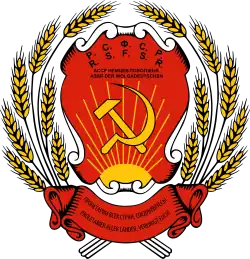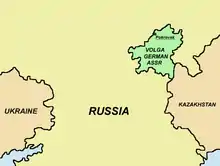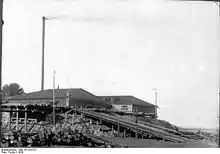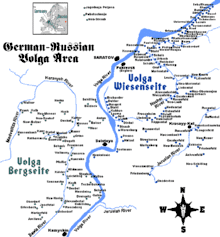Volga German Autonomous Soviet Socialist Republic
The Volga German Autonomous Soviet Socialist Republic (German: Autonome Sozialistische Sowjetrepublik der Wolgadeutschen; Russian: Автономная Советская Социалистическая Республика Немцев Поволжья, romanized: Avtonomnaya Sovetskaya Sotsialisticheskaya Respublika Nemtsev Povolzh'ya), abbreviated as the Volga German ASSR, was an autonomous republic of the Russian SFSR. Its capital city was Engels (known as Pokrovsk or Kosakenstadt before 1931) located on the Volga River. As a result of the German invasion of the Soviet Union in 1941, the Volga German ASSR was abolished and Volga Germans were exiled.
| Volga German Autonomous Soviet Socialist Republic | |||||||||||
|---|---|---|---|---|---|---|---|---|---|---|---|
| ASSR of the Russian SFSR | |||||||||||
| 1918–1941 | |||||||||||
 Flag
 Coat of arms
| |||||||||||
 | |||||||||||
| Capital | Engelsa | ||||||||||
| Area | |||||||||||
• 1941 | 28,400 km2 (11,000 sq mi) | ||||||||||
| Population | |||||||||||
• 1941 | 606,000 | ||||||||||
| History | |||||||||||
| Government | |||||||||||
| • Motto | Proletarier aller Länder, vereinigt Euch! (English: Workers of the world, unite!) | ||||||||||
| Chairman (Central Executive Committee) | |||||||||||
• October 1918–March 1919 | Ernst Reuter | ||||||||||
| Legislature | Supreme Council of the Volga German Autonomous Soviet Socialist Republic | ||||||||||
| History | |||||||||||
• Established | 19 October 1918 | ||||||||||
• Disestablished | 28 August 1941 | ||||||||||
| Political subdivisions | 14 cantons | ||||||||||
| |||||||||||
| Today part of | Russia | ||||||||||
| a. Known as "Pokrovsk" or "Kosakenstadt" before 1931. | |||||||||||



History
The first provision for special status for Volga Germans in the Russian SFSR was created following the October Revolution, by October 29 (some claim 19) 1918[1] Decree of the Soviet government. The Labour Commune of Volga Germans. This gave these Soviet Germans a special status among the non-Russians in the USSR.[2] It was restructured as the Autonomous Soviet Socialist Republic on February 20, 1924 (claims of December 19, 1923),[1][2] by the Declaration of the All-Russian Central Executive Committee and the Council of People's Commissars of the Russian SFSR. It became the first national autonomous unit in the Soviet Union after the Donetsk–Krivoy Rog Soviet Republic. It occupied the area of compact settlement of the large Volga German minority in Russia, which numbered almost 1.8 million by 1897. The republic was declared on January 6, 1924.
At the moment of declaration of autonomy, an amnesty was announced. However, it eventually was applied to a small number of people. According to the policy of korenizatsiia, carried out in the 1920s in the Soviet Union, usage of the German language was promoted in official documents and Germans were encouraged to occupy management positions. According to the 1939 census, there were 366,685 Germans in the autonomy.
By January 1, 1941, the Volga Germans Autonomous Soviet Socialist Republic included the city of Engels and 22 cantons:[3] Baltsersky, Gmelinsky, Gnadenflyursky, Dobrinsky, Zelmansky, Zolotovsky, Ilovatsky, Kamensky, Krasnoyarsky, Krasnokutsky, Kukkussky, Lizandergeysky, Marientalsky, Marxshtadtsky, Pallasovsky, Staro-Poltavsky, Ternovsky, Untervaldsky, Fedorovsky, Franksky, Ekgeimsky and Erlenbakhsky.
The German invasion of the Soviet Union in 1941 marked the end of the Volga German ASSR. On August 28, 1941, the republic was formally abolished and, out of fear they could act as German collaborators, all Volga Germans were exiled to the Kazakh SSR, Altai and Siberia.[4] Many were interned in labor camps merely due to their heritage.[2] On September 7, 1941, the republic was formally extinguished and its territory divided between the Saratov Oblast (15 cantons) and the Stalingrad Oblast (7 cantons).[5][2]
Following the death of Stalin in 1953, the situation for Volga Germans improved dramatically. In 1964, a second decree was issued, openly admitting the government's guilt in pressing charges against innocent people and urging Soviet citizens to give the Volga Germans every assistance in their "economic and cultural expansion". With the existence of a socialist German state in East Germany now a reality of the post-war world, the Volga German Autonomous Soviet Socialist Republic was never reestablished.
Beginning in the early 1980s and accelerating after the fall of the Soviet Union, many Volga Germans have emigrated to Germany by taking advantage of the German law of return, a policy which grants citizenship to all those who can prove to be a refugee or expellee of German ethnic origin or as the spouse or descendant of such a person.[6]
Population
The following table shows population of the ethnic groups of the Volga German ASSR:[7]
| 1926 census | 1939 census | |
|---|---|---|
| Germans | 379,630 (66.4%) | 366,685 (60.5%) |
| Russians | 116,561 (20.4%) | 156,027 (25.7%) |
| Ukrainians | 68,561 (12.0%) | 58,248 (9.6%) |
| Kazakhs | 1,353 (0.2%) | 8,988 (1.5%) |
| Tatars | 2,225 (0.4%) | 4,074 (0.7%) |
| Mordvins | 1,429 (0.3%) | 3,048 (0.5%) |
| Belarusians | 159 (0.0%) | 1,636 (0.3%) |
| Chinese | 5 (0.0%) | 1,284 (0.2%) |
| Jews | 152 (0.0%) | 1,216 (0.2%) |
| Poles | 216 (0.0%) | 756 (0.1%) |
| Estonians | 753 (0.1%) | 521 (0.1%) |
| Others | 710 (0.1%) | 3,869 (0.6%) |
| Total | 571,754 | 606,352 |
Leaders
Heads of state
- Central Executive Committee Chairmen (see Ispolkom)
- 1918–1919: Ernst Reuter (1889–1953) (German statesman, diplomat, Mayor of Berlin)
- 1919–1920: Adam Reichert (1869–1936) (teacher, journalist, kolkhoznik)
- 1920: Alexander Dotz (1890–1965+) (World War I participant, Russian statesman)
- 1920–1921: Vasiliy Pakun (Russian statesman)
- 1921–1922: Alexander Moor (1889–1938) (World War I and Russian Civil War participant, Russian general, Russian statesman, Turkmenistani statesman, Uzbekistani statesman, shot in Tashkent)
- 1922–1924: Wilhelm Kurz (1892–1938) (Russian statesman, shot)
- 1924–1930: Johannes Schwab (1888–1938) (Russian statesman, shot)
- 1930–1934: Andrew Gleim (1892–1954) (Russian statesman)
- 1934–1935: Heinrich Fuchs (?–1938) (Russian statesman, shot)
- 1935–1936: Adam Welsch (1893–1937) (World War I participant, chekist, regional party leader, Russian statesman, shot)
- 1936–1937: Heinrich Lüft (1899–1937) (Russian statesman, shot)
- 1937–1938: David Rosenberger (?–?) (Russian statesman)
- Supreme Council Chairman
- 1938–1941: Konrad Hoffmann (1894–?) (World War I participant, railways worker, Russian statesman)
Heads of government
- Sovnarkom of the Republic
Created on January 12, 1924, by the declaration at the first session of the Central Executive Committee of the Republic
- 1924–1929: Wilhelm Kurz (1892–1938) (Russian statesman, shot)
- 1929–1930: Andrew Gleim (1892–1954) (Russian statesman)
- 1930–1935: Heinrich Fuchs (?–1938) (Russian statesman, shot)
- 1935–1936: Adam Welsch (1893–1937) (World War I participant, chekist, regional party leader, Russian statesman, shot)
- 1936–1937: Heinrich Lüft (1899–1937) (Russian statesman, shot)
- 1937–1938: Wladimir Dalinger (1902–1965+) (Russian Civil War participant, security forces officer, Russian statesman, entrepreneur)
- 1938–1941: Alexander Heckman (1908–1994) (engineer, Russian statesman, Gulag survivor)
See also
References
- "Encyclopedia of History of Communist Part".
- J. Otto Pohl (1999). Greenwood Publishing Group (ed.). Ethnic Cleansing in the USSR, 1937-1949 (illustrated ed.). pp. 29–37. ISBN 0-313-30921-3.
- "Административные преобразования в АССР немцев Поволжья". Archived from the original on 21 September 2009.
- Президиум Верховного Совета СССР. Указ от 28 августа 1941 г «О переселении немцев, проживающих в районах Поволжья». (Presidium of the Supreme Soviet of the USSR. Decree of 28 August 1941 On Resettlement of Germans living in the Volga Region. ).
- Президиум Верховного Совета СССР. Указ от 7 сентября 1941 г «Об административном устройстве территории бывшей Республики Немцев Поволжья». (Presidium of the Supreme Soviet of the USSR. Decree of 7 September 1941 On Administrative Structure of the Territory of the former Republic of Volga Germans. ).
- Barbara Dietz, "German and Jewish migration from the former Soviet Union to Germany: Background, Trends and Implications", Journal of Ethnic and Migration Studies 26, No. 4 (October 2000): 635-652.
- "Демоскоп Weekly № 839 - 840". www.demoscope.ru.
External links
- Autonomous SSR of the Volga Germans
- (in Russian and German) Native Volga-German - researcher of his heritage
- German Villages in the Volga Valley of Russia
- High resolution map of VGASSR
- City of Pallasowka, Canton of the Volga-German ASSR
- (in Russian) Guide to the history of the Communist Party and the Soviet Union
- City of Marx, Canton of the Volga-German ASSR
- (in Russian) Документальный фильм о городе Маркс (documentary about the city of Marx).